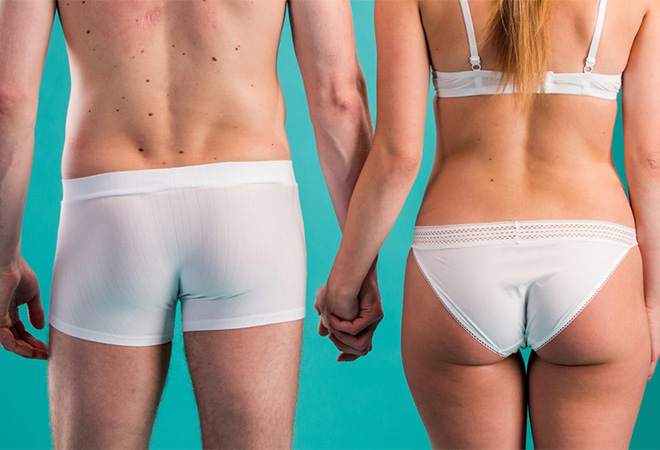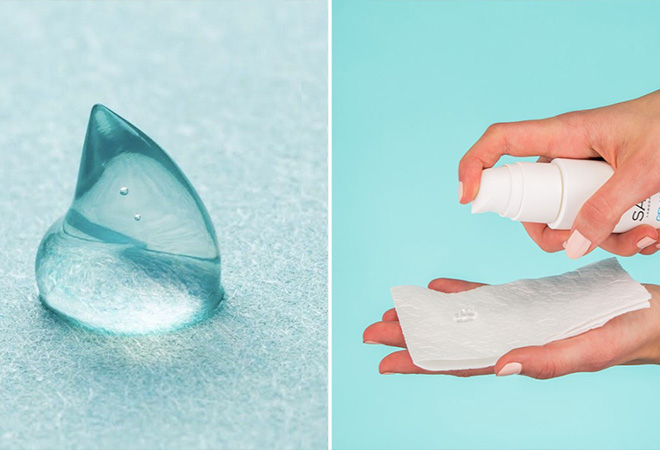Entrepreneurs often begin their journey with pipe dreams. SATU Laboratory’s source of inspiration was a pipe problem. Sewage problems due to non-biodegradable components such as wet wipes, cotton buds, or oils poured down the drain cost cities millions: in London alone, Thames Water spent £18 million annually clearing over 75,000 blockages, 93% of which are caused by wet wipes. A recent study by Ryerson University showed that of 101 single-use wipes, none, even the 23 which were marketed as flushable, were able to disperse safely in a sewer system. Companies such as Plus and Submission have overhauled shower gels and glitter respectively to make them sewer system–friendly; in another turn of sustainability through formulation, the wet-wipe space is getting a much-needed makeover.
For hygienic purposes, the format has an undeniable (paper’s) edge over its dry counterpart. And yet many use the latter: 28 million versus 3.23 million people purchase standard toilet paper versus wet wipes in the UK. But with an increased focus on keeping clean, these tides could shift. In certain cultures the use of bidets is commonplace, but in the US or UK for example, the fountains do not runneth.
SATU Laboratory offers an environmental and convenient option: Gel Wipe, a formula which instantly turns toilet paper into a biodegradable wet wipe. “If you think about washing our hands, nobody uses just paper. It’s strange that we wouldn’t want this clean hygienic feel for other parts of our body,” argues co-founder Toomas Plunt. In the company’s market research across 1,000 people from the US, Europe, and Australia, they found that only 50% used wet wipes.


SATU Laboratory’s Chief Executive Officer Siim Saat didn’t pay the subject much mind until he was forced to face the fallacy of dry toilet paper whilst struck with a stomach bug. Once he started using wet wipes, the curious Saat started to read between the lines on the packaging. “I discovered that although they are marketed as flushable, they often contain plastics or recycled cellulose fibers. Even though those are all-natural, they don't dissolve quickly enough in the sewer systems,” he explains. As Saat points out, regular toilet paper dissolves in 5 minutes, bamboo toilet paper in 10 minutes, and flushable wipes in 35 minutes or more. Since the product is flushed down to the first pumping station within 15 minutes, the wipes are still completely intact when they have entered the network.
Studying for his bachelor’s degree in pedagogy at Tallinn University in Estonia at the time of product inception (2008), Saat’s journey took root in self-teaching and sheer determination. After educating himself on the physical details of product development such as optimal viscosity and ingredient safety, undertaking consumer studies measuring factors such as the frequency of wiping and amount of product required per dose, as well as creating a DIY prototype, he contacted close to 150 laboratories around the world.
Less than half responded, but finally he was able to start development with Caola in Hungary, putting his entire student loan towards production. “It was a crazy time. I barely had any money and all my friends thought that I should do something different [with my time and resources],” he recalls. The final formulation has only 15 ingredients, among them panthenol and vitamin E for moisturization. After extensive safety testing, including by the likes of Intertek, the product, packaged in portable pump bottles made in Italy, launched in 2018, with distribution at local pharmacies in Tallinn. “Without any marketing, we sold over a few hundred bottles in the first month, locals were really enthusiastic about it,” Saat recalls. The product made its Amazon debut one year later. Today, SATU Laboratory is distributed in over nine different countries, including the US, UK, Australia, Canada, and Germany.
Since then, there has been a rise in companies addressing this space —Wype, FreshX, Cheeky, Pristine, and for female-specific needs, Luna Daily—but ultimately Saat hopes for environmental and hygienic benefits for all parties (and posteriors) involved. “We don't think we have discovered some holy grail, but it's one step closer to a better future,” he humbly states. To date, the Gel Wipe has replaced over 15 million wet wipes from blocking sewer systems, with numbers steadily growing by the day.
Opening consumers’ eyes to the fine print of sustainability claims extends beyond wet wipes. “Greenwashing is a huge problem. There are a lot of products on the market that claim they are compostable, but they never mention that this is only possible in an industrial compost environment, with special machines, a specific moisture level, and at least 50-60 degrees celsius, two to three days in a row,” he explains.
Saat’s mission doesn’t end with the launch of SATU Laboratory’s product. Instead, the entrepreneur contacted a host of toilet paper manufacturers, spreading awareness around the lack of regulation of terms like flushable and biodegradable. To his surprise, they disregarded his appeal and the need for a product like Gel Wipe. “In the beginning I was quite frustrated at why they weren’t believing the facts and data I was presenting. Now, I understand perfectly well why they didn't take us seriously, because who am I? Just a random guy from a small nation who doesn't have any background, industry contacts, or influence. And of course they had already invested in their own wet wipe production,” he comments. Since then, the tides have turned. “After a few years, when there was more research evidence for the environmental concerns, we reconnected with some of the manufacturers and officially tested our products. Now we can say that our gel works with most popular toilet paper brands in North Europe,” Saat proclaims.
This persistence and firm belief in the concept behind SATU Laboratory has been a steadfast component of the company’s success, especially after Saat’s original idea of creating the gel product in collaboration with existing manufacturers was unsuccessful. “They told me that making a moisturizing component that doesn't immediately dissolve toilet paper can't be done. Then we made it. They told us that there might not be a market. We proved that there is one,” he proudly states.
For the future, the company is looking to develop complementary products to its debut products: scented options, an alcohol-free version, refill pouches, and smaller formats for travel. Switching to truly flushable and biodegradable options may be one small step for the individual consumer, but one giant leap for sustainability.